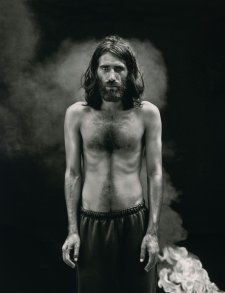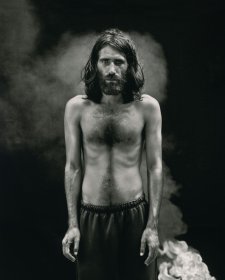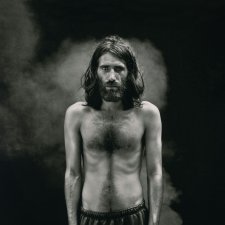- About us
- Support the Gallery
- Venue hire
- Publications
- Research library
- Organisation chart
- Employment
- Contact us
- Make a booking
- Onsite programs
- Online programs
- School visit information
- Learning resources
- Little Darlings
- Professional learning
Kurdish-Iranian journalist, writer and filmmaker, Behrouz Boochani, was born in Iran in 1983. He attained a postgraduate degree in political geography and geopolitics before working as a freelance journalist, his articles addressing subjects including Middle East politics and Kurdish culture. Co-founder of the Kurdish magazine Werya, he went into hiding in early 2013 following the imprisonment of eleven colleagues, having narrowly avoided arrest and interrogation himself. In May 2013, still under threat due to his political activities and activism, Boochani fled Iran in 2013 seeking asylum. He was among the 75 asylum seekers intercepted by the Australian Navy on route from Indonesia in July, a matter of days after the Rudd Government announced its offshore detention plan. Boochani immediately sought asylum in Australia and was detained initially at Christmas Island before being transferred to the Australian-run Manus Island Detention Centre in Papua New Guinea. Boochani was among a group of 100 detainees who refused to be processed by PNG immigration officials, asserting their right to be processed for asylum in Australia. At the same time, he started contacting journalists, activists and human rights organisations, reporting on conditions and human rights abuses via mobile phone messages sent in secret to the Guardian, Sydney Morning Herald and other news outlets as well as to bodies including PEN International and the UN. His film Chauka, Please Tell Us the Time – shot entirely on mobile phone and co-directed with a Dutch-based Iranian filmmaker – was released in 2017, the year the Manus Island centre was closed. Boochani and fellow detainees remained on Manus Island until he was relocated to Port Moresby in 2019. He was granted refugee status by New Zealand in July 2020. During his time in detention, Boochani published poems and articles, and narrated the animated short film Nowhere lines: Voices of Manus Island giving voice to the experience of the refugees. His memoir, No Friend but the Mountains – which was written in Persian on Boochani's mobile and then 'smuggled' out in fragments via messages on WhatsApp – won the National Biography Award, the Victorian Prize for Literature, and the Victorian Premier's Prize for Nonfiction in 2019, and was named non-fiction Book of the Year and Audiobook of the Year at the Australian Book Industry Awards. Boochani's journalism and advocacy for asylum seekers has been recognised with awards from Amnesty International among other organisations.
Purchased 2023
© Hoda Ashfar



On one level The Companion talks about the most famous and frontline Australians, but on another it tells us about ourselves.



Kurdish-Iranian writer and filmmaker Behrouz Boochani on his portrait by Hoda Afshar, recently acquired by the National Portrait Gallery.



Visit us, learn with us, support us or work with us! Here’s a range of information about planning your visit, our history and more!